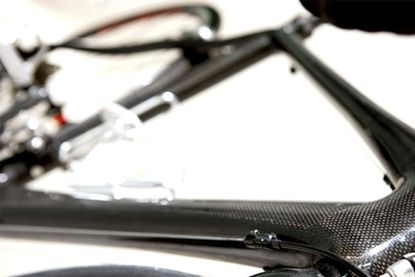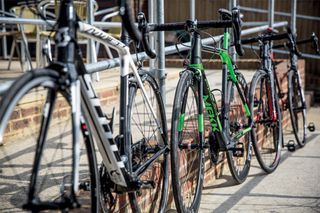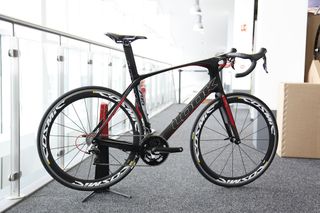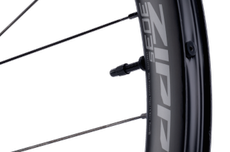Cheap Chinese carbon imports: are they worth the risk?
Low-price carbon frames available online may seem like tantalising bargains, but can you trust their quality, asks Marc Abbott

Most of us have at some point been drawn to eBay to trawl the listings for a frame in our size and at a price that won’t see us cast out into the doghouse for a week.
Alongside the used bikes and official bike shop listings, there are a huge number of very cheap, unbranded carbon alternatives, often from China.
For the road cyclist looking for a unique bike and who is not concerned with brand names and logos, building up one of these frames with the finishing kit and groupset of choice is a very tempting prospect.
>>> Is it the end for the 34t chainring?
But if the price seems too good to be true, can we trust these frames? Have they gone through the same stringent testing procedures as named brands? And what comeback do you have if something goes awry while you’re riding it?
Online bike business VeloBuild offers carbon frames for sale online from as little as $339 (£226).
Chris Mei, director of VeloBuild’s office in Shenzhen, China, explains how these low prices are achieved: “The frames we sell are what we call ‘open common tool’ [a generic mould that anyone can purchase and use], so the price is much cheaper.
"Bigger brands usually have their own mould and tool, so their frame is special and only for them. They can pay for the mould cost and so their retail prices are higher.”
>>> Do we need 12-speed gears?
One of the primary concerns among UK cyclists when considering buying a frame online from China is the lack of warranty offered.
While you’re unlikely to find such assurances from an eBay seller, Mei is quick to point out that his company does guarantee the quality of its frames: “Our carbon frames have a two-year warranty which covers everything except ‘human destruction’.”
One UK bike importer we spoke to, who wished to remain nameless, raised serious concerns about the number of frame failures they had witnessed in Chinese carbon products.
Mei, however, assures us that his frames — made from high-tensile Toray 700 and aerospace grade 800 and 1000 carbon-fibre — meet the relevant EN European standards for sales in the UK.
>>> Are electronic groupsets necessary?
Neil Ball of UK carbon repair specialist Carbon Bike Technics has a theory as to why reported instances of frame failures are uncommon.
“We don’t see many unbranded frames through the workshop,” he says, “but this might be because of the cost implications.
“It would cost about the same amount of money to get one of these frames repaired professionally as it would to simply buy another new frame from China on the internet.”
>>> Can you trust repaired carbon bike frames?
Maybe we’re wrong to be wary of these frames, especially as they’re often made in the same factories that manufacture brand-name bikes.
Mei confirms: “Our factory in Shenzhen also makes frames for some well-known brands. I can’t say which brands — that’s confidential.”
If you're buying a frame, you'll need to know which groupset to put on it
The dark side
Big-name brands are quick to challenge the reliability of cheaper Chinese imports, especially in light of a number of high-profile scares over the influx of counterfeit frames coming to Europe.
Audrey Sogny, Look Cycle’s media officer, says: “The safety of the [counterfeit] frame is clearly compromised. Imagine what would happen if you were descending and the frame broke.”
>>> The disc brakes debate: are they necessary on road bikes?
Which leads us back to the ‘too cheap to be true’ maxim. Sogny won’t be drawn on how to spot a fake, explaining: “We don’t want to tell people how to know when they have a counterfeit frame because that gives clues to the counterfeiters on how to make them.
"If a customer has any doubt about whether their frame is genuine, they should contact our aftersales service.”
>>> Winter bikes: do you really need one?
On the broader subject, Sogny continues: “A lot of big firms in the Far East, like Giant in Taiwan, for instance, have the correct quality controls. But if you buy a cheap frame — not necessarily a counterfeit — you should be aware of the possible consequences.”
Our take
It seems there might be a middle ground here: buying through a specialist firm rather than eBay.
For us, though, there’s no substitute for visiting a dealer, sitting on a bike and getting the right one for you in terms of quality and safety, not just the cheapest.
Even UK online retailers are good at dealing with issues arising from bike sales, and are also in the same time zone.

For: Chris Mei - VeloBuild
“We have customers from the UK, and all our carbon frames are made to the same procedure as well-known brand name frames, and in the same factory.
"They come with a warranty and conform to the relevant EN standard for safety. As well as testing, we build bikes for our test riders to review on our website, and customers can share experiences on our forum.”

Against: Audrey Sogny - Look Cycle media officer
“I think you should be aware when you buy a frame that it has traceability; this is the case for all products, not just bikes. This is the customer’s responsibility when they purchase a frame.
"The main reason you should avoid cheap carbon frames is the safety implications. If you’re riding and something goes wrong, your life could be endangered.”
The first version of this article originally appeared in the May 21, 2015 print issue of Cycling Weekly

Thank you for reading 20 articles this month* Join now for unlimited access
Enjoy your first month for just £1 / $1 / €1
*Read 5 free articles per month without a subscription

Join now for unlimited access
Try first month for just £1 / $1 / €1
Get The Leadout Newsletter
The latest race content, interviews, features, reviews and expert buying guides, direct to your inbox!
Jack Elton-Walters hails from the Isle of Wight, and would be quick to tell anyone that it's his favourite place to ride. He has covered a varied range of topics for Cycling Weekly, producing articles focusing on tech, professional racing and cycling culture. He moved on to work for Cyclist Magazine in 2017 where he stayed for four years until going freelance. He now returns to Cycling Weekly from time-to-time to cover racing, review cycling gear and write longer features for print and online.
-
 Ask a coach: ‘Should I cycle commute every day?’
Ask a coach: ‘Should I cycle commute every day?’The length of your commute is a major factor; but there are ways to adapt your routine to maximise on the gains of riding into work
By Alex Welburn Published
-
 Opportunity knocks for Demi Vollering and Elisa Longo Borghini at open La Vuelta Femenina
Opportunity knocks for Demi Vollering and Elisa Longo Borghini at open La Vuelta FemeninaStrong field lines up for what is now an eight-stage race with three summit finishes
By James Shrubsall Published
-
 Tech Question: We're used to racers on narrow bars - but are they more comfortable, too?
Tech Question: We're used to racers on narrow bars - but are they more comfortable, too?We ask the experts what to look for in determining the optimal handlebar width
By Joe Baker Published
-
 Tech Question: Where do things now stand on press-fit bottom brackets? Good or bad?
Tech Question: Where do things now stand on press-fit bottom brackets? Good or bad?Few innovations have garnered as much animosity as press-fit bottom brackets - but the tech now has some strong proponents
By Stefan Abram Published
-
 Tech Question: Is a proper clean the only disc brake upgrade you need?
Tech Question: Is a proper clean the only disc brake upgrade you need?Bike mechanic and owner of Surrey Hills Cycleworks, Dave Farmer, shares his tips on how to improve braking performance
By Stefan Abram Published
-
 What are hookless rims and do you need them?
What are hookless rims and do you need them?With the big wheel brands launching new rims with straight sidewalls, we ask whether hookless technology can benefit your bike riding
By Simon Smythe Published
-
 Do you need indoor cycling specific clothing?
Do you need indoor cycling specific clothing?With an ever expanding range of indoor cycling kit available, we ask if it really makes any difference?
By Michelle Arthurs-Brennan Published
-
 Is a stiffer bike really faster?
Is a stiffer bike really faster?We take a closer look at one part of the holy trinity of frame design
By Michelle Arthurs-Brennan Published
-
 Will swapping your chain lube make you faster?
Will swapping your chain lube make you faster?Chain lube is coming of age - we explore some of the newest creations
By James Bracey Published
-
 How do you choose the perfect rim depth for you?
How do you choose the perfect rim depth for you?If money were no object, we'd all have a wheel wardrobe full of options. But for most of us, compromise is essential.
By Michelle Arthurs-Brennan Published